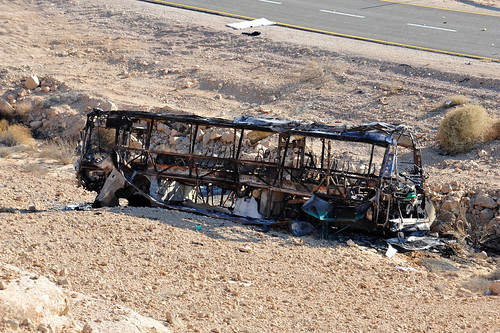As is well known by now, a group of students from UCI's Muslim Student Union (along with some of their peers from UC Riverside) stood up one at a time to shout down Ambassador Oren, in accordance with a plan the group had prepared in advance. They were successful: Oren was unable to continue with his remarks until the last of the eleven "activists" had been led from the hall in handcuffs.
The University, having long remained silent despite numerous instances of hostile behavior on the part of the MSU, finally took action. The administration banned the MSU from campus for one year (later shortening the already minimal suspension to a single academic quarter). Faced with overwhelming outrage from the Jewish community, Orange County DA Tony Rackauckas filed charges against the eleven participants for "disrupting a public meeting" and for conspiring to do so. The students (save one who had earlier agreed to a plea bargain) were recently convicted and sentenced to 56 hours of community service, probation, and a token fine.
Victory? Maybe. But I tend to agree with noted Constitutional scholar and dean of UCI's law school Erwin Chemerinsky, who wrote:
Unless there is harm to persons or property–or a serious threat of this–district attorneys are almost always content to leave discipline to school authorities. This is exactly what Rackauckas should have done. No one was hurt, and no property was damaged. After the disruptive students were escorted away, Ambassador Oren finished his speech. The students acted wrongly, and they were punished by the campus; there was no need for anything more.
Dr. Chemerinsky goes on to conclude that the DA "failed... to do justice". Here we part ways: there is no question that justice was done. The students broke the law and were arrested, tried by a jury, and properly convicted. But in his main argument, that Rackauckas should have exercised his discretion to avoid filing charges in the first place, Chemerinsky is correct.
The dean's primary interest may be the intrusion of law enforcement into internal University matters. But I'm more concerned with the megaphone that the prosecution has put into the hands of MSU and their supporters. Thanks to the trial, the self-described "Irvine 11" have become the darlings of the far left, anti-Israel, pro-Hamas mobs. Coverage of the trial and verdict has gone global, from the Jerusalem Post to the New York Times to al Jazeera. Most of this coverage inclines favorably towards the students, who have engaged in a relentless publicity campaign, making hay while the sun shines.
It's hard to blame those who view the "Irvine 11" sympathetically. Yes, the kids are bullies, and anti-Semitic bullies at that. But my own kids will be in college very soon, and it seems to me that if they were to get arrested and tried for shouting at a lecture, I would be outraged. It would matter little what agenda they were promoting—such questions would be eclipsed by the seemingly greater injustice of the prosecutors' abuse of discretion. It shouldn't surprise us then when the MSU kids' families and community respond in the same way.
 This didn't have to happen. Without a trial, there are no op-eds in national and international journals, no speaking engagements before crowded mosques, no fundraising letters hinting darkly at the justice-perverting power of "the Israel lobby". Without a trial, there are no new martyrs inspiring the enemies of Israel and America. Without a trial, the event is local, the consequences local, and the media coverage local.
This didn't have to happen. Without a trial, there are no op-eds in national and international journals, no speaking engagements before crowded mosques, no fundraising letters hinting darkly at the justice-perverting power of "the Israel lobby". Without a trial, there are no new martyrs inspiring the enemies of Israel and America. Without a trial, the event is local, the consequences local, and the media coverage local.
We have only ourselves to blame. The Orange County Jewish community, in its appropriate but overwrought outrage at the MSU's frequent thuggish behavior, has played right into the hands of our opponents. In exchange for the dim comfort offered by the convictions, we have handed our enemies two invaluable assets: a cause célèbre and a set of attractive young icons. If this is victory, it is a Pyrrhic one at best.
When will we learn? Some anti-Israel or anti-Semitic incidents, galling though they may be, simply do not merit a sustained, pugnacious response. Nuance, too, has its place. Discretion has its place. And, frankly, simple good judgment has its place as well.
There are times when a quiet conversation will accomplish far more than a public prosecution. Irritating and offensive though it was, the UCI incident was one of those occasions.
It's hard to blame those who view the "Irvine 11" sympathetically. Yes, the kids are bullies, and anti-Semitic bullies at that. But my own kids will be in college very soon, and it seems to me that if they were to get arrested and tried for shouting at a lecture, I would be outraged. It would matter little what agenda they were promoting—such questions would be eclipsed by the seemingly greater injustice of the prosecutors' abuse of discretion. It shouldn't surprise us then when the MSU kids' families and community respond in the same way.
 This didn't have to happen. Without a trial, there are no op-eds in national and international journals, no speaking engagements before crowded mosques, no fundraising letters hinting darkly at the justice-perverting power of "the Israel lobby". Without a trial, there are no new martyrs inspiring the enemies of Israel and America. Without a trial, the event is local, the consequences local, and the media coverage local.
This didn't have to happen. Without a trial, there are no op-eds in national and international journals, no speaking engagements before crowded mosques, no fundraising letters hinting darkly at the justice-perverting power of "the Israel lobby". Without a trial, there are no new martyrs inspiring the enemies of Israel and America. Without a trial, the event is local, the consequences local, and the media coverage local.We have only ourselves to blame. The Orange County Jewish community, in its appropriate but overwrought outrage at the MSU's frequent thuggish behavior, has played right into the hands of our opponents. In exchange for the dim comfort offered by the convictions, we have handed our enemies two invaluable assets: a cause célèbre and a set of attractive young icons. If this is victory, it is a Pyrrhic one at best.
When will we learn? Some anti-Israel or anti-Semitic incidents, galling though they may be, simply do not merit a sustained, pugnacious response. Nuance, too, has its place. Discretion has its place. And, frankly, simple good judgment has its place as well.
There are times when a quiet conversation will accomplish far more than a public prosecution. Irritating and offensive though it was, the UCI incident was one of those occasions.















